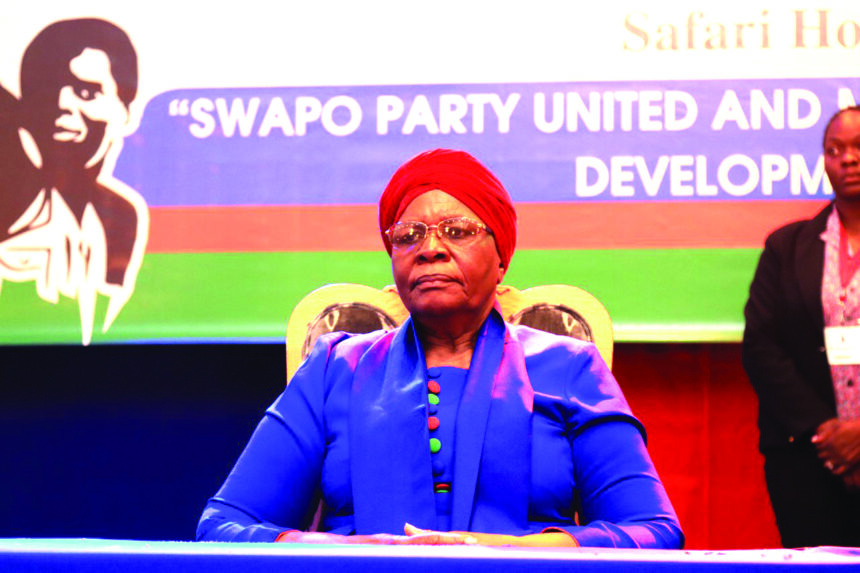Lahja Nashuuta
Zimbabwean-born public speaker Joshua Maponga has told the ruling party to set the nation’s agenda, and to never be mistaken for an opposition party.
He said this during one of the discussions to unpack Swapo’s election manifesto in the capital on Monday.
“Swapo, hear me well. Stop acting like an opposition party. You are the ruling party, not an opposition party. Set the agenda items loud and clear. And let the rest of the nation follow your agenda as the ruling party.
You don’t have to constantly apologise and say things to correct things. Make the path, and the rest of the political parties and the rest of those barking on the side must follow your lead, as you’re the leaders,” he stated.
At the heart of Maponga’s lecture to Swapo was to invest in agriculture and land reform.
He advised the government to emulate China’s land reform strategy.
“No one owns land in China. The government owns the land. We give you lease agreements. When you die and the lease expires, the land flows back to the owners, who are the State,” he said.
He added: “We challenge Swapo to deal with land issues violently. Take off those bloody gloves. Get down to business. Be strategic, be thoughtful, be mindful, be future-seeing, and put strategies that will work”. Experts from various governmental institutions, civil society organisations and members of the public converged at a Windhoek hotel to dissect the party’s 2024 election manifesto.
“I am giving a strategy. For the next five to 10 years, develop serious commercial farmers who understand agribusiness. From soil to plants to animal husbandry, to those who understand it fully. Then take the communal land that is now available. Experiment with them. Teach them. Let them know how to do the food security business. Remember, guys, the guy who feeds you controls your mouth,” he added.
Agriculture
Maponga advised Swapo to develop agricultural institutions to train the youth.
“Five years from now – 10 years from now, with your first graduates, you can begin approaching critical farmers and purchase those farms. Because chasing them away without a long-term plan, you may have to follow the path that Zimbabwe took,” he cautioned. He said Namibia is going back to organic farming by investing in indigenous seeds, and ensuring that people have access to water.
Manifesto
Swapo presidential candidate Netumbo Nandi-Ndaitwah maintained that over the past 34 years, they have built a solid foundation in key sectors such as education, healthcare, infrastructure and industrial development. “We have expanded access to basic services, introduced key reforms, and laid the groundwork for future generations to thrive,” she said. She acknowledged the challenges, but emphasised the party’s commitment to investing in education, sport and the creative industry to ensure their success.
Her party promises to create 256 000 jobs if re-elected. “Our commitment to quality education and skills development is not only about creating jobs, but ensuring that our young people have the tools to innovate and lead in a competitive global economy,” she remarked. The Swapo manifesto places emphasis on universal healthcare access.
“We will continue to expand access to quality healthcare services, improve public health infrastructure, and offer stronger social safety nets to protect the most vulnerable members of our population,” Nandi-Ndaitwah observed.
Medical expert Herman Shitaleni pointed to inadequate infrastructure and a lack of health professionals such as doctors and other specialists as some challenges facing the public health sector.
He stressed that there is a shortage of key medications, including vaccines as well as medical equipment.
Shitaleni, however, acknowledged the country’s achievements, which include building health facilities all over.
At independence, there were 270 medical facilities in Namibia, the medical doctor said.
Today, there are 530 facilities, including the first-ever medical school, achievements Swapo takes pride in.
Food security
In terms of agriculture and food security, the party was advised to invest in Green Schemes to boost crop production, promote value-addition and improve market access.
“If we are to put the available irrigable land of 12 000 hectares under production, we will be able to produce 108 000 metric tonnes of maize and eat,” he said.
He added that 26 258 ha are required to close the gap. Executive director in the ministry of agriculture and land reform Ndiyakupi Nghituwamata said: “Government must continue the provision of subsidised agricultural inputs and services, investing in robust early warning systems, as well as promoting and supporting the production of vegetables through backyard gardens and agricultural value chains.”
With regards to enhanced livestock production, Nghituwamata said there is a need to establish new feedlots, and the continued operationalisation of abattoirs.
Roads infrastructure
Hippy Tjivikua, CEO of the Walvis Bay Corridor Group, focused on Namibia’s world-class roads infrastructure.
“Namibia’s ICAO ranking has improved from 57.39% in 2016 to 72.62% in 2024, while the Effective Implementation (EI) record for East and Southern Africa stands at 60%, with the global average at 69.3%,” he said.
Tjivikua maintained that Namibia boasts the best corridor management institution on the continent. “At Independence, our ports were handling less than 200 000 metric tonnes of cargo with 12 000 twenty-foot equivalent units (TEUs). In 2024, we will handle six million tonnes with 750 000 TEU capacity,” he continued. Tjivikua, however, said there is a need to introduce One-Stop-Border Posts (OSBP) at key borders with Angola, Botswana and Zambia to facilitate trade and support logistics’ hub aspirations.



